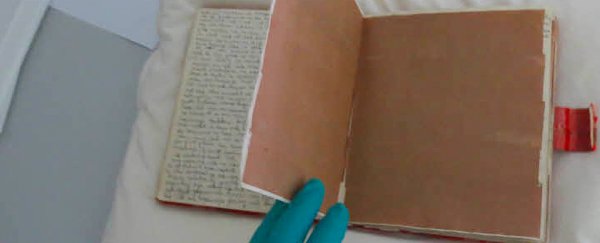Hidden pages from the diary of Holocaust refugee Anne Frank have been analysed for the first time, revealing a few words of wisdom on sex, menstruation, and a handful of dirty jokes.
Non-invasive imaging technology has finally allowed curators of the Anne Frank Museum to see what lay behind sheets of brown paper that had been glued over pages in one of the notebooks, adding new details to a tragic figure.
For more than half a century, the writings of the 13-year-old girl have served as an emotional reminder of the plight of Jews fleeing atrocity in Nazi Germany.
Frank's father, Otto, brought his family to Amsterdam to escape economic hardship and the threat of persecution in pre-war Germany.
Within several years conflict had erupted and the Netherlands was occupied, forcing the Franks into hiding in a secret annex to avoid being taken to the infamous concentration camps.
Frank's accounts of her family's time in hiding have become world famous, including stories, quotes, and musings that she recorded in the hope of one day being published as an eyewitness account of the suffering wrought at the hands of the Nazis.
Tragically, Frank would never see her diaries finished, or published.
The only member of her family to survive was her father Otto, who carried the books with him until he could finally fulfil his daughter's wish to see them shared.
Although tens of millions around the world have read her words, until now there have been a few pages that Frank clearly wasn't prepared to have others read.
In 2016, during a routine check of the diaries, curators of the Anne Frank Museum noticed that sheets of brown paper glued into one of the notepads were obscuring writing.
In order to preserve the integrity of the books, they could only wait until technology was available to image the script behind the paper without causing damage.
What they found was an exercise in literary prose, as Frank slipped into a narrative where she offers sexual advice to an unnamed person.
Peter de Bruijn from the Huygens Institute for the History of the Netherlands explains the details are less interesting for being sexual in nature – which Frank already touches on in her diaries – but for their writing style.
"She starts with an imaginary person whom she is telling about sex, so she creates a kind of literary environment to write about a subject she's maybe not comfortable with," de Bruijn told The New York Times.
Whatever the initial intent was for the pages, Frank clearly felt they served as scraps to jot down her more frivolous thoughts.
"I'll use this spoiled page to write down 'dirty' jokes," she writes, before adding, "Do you know why the German Wehrmacht girls are in the Netherlands? As mattresses for the soldiers."
Copyright laws mean the text is currently only available in Dutch, with no publicly available translations of the full script being planned at this stage.
While it's debatable that the release of writing Frank self-censored is respectful, the head of collections at the Anne Frank House, Teresien da Silva, believes it's for the greater good.
"It's important sometimes for scientific research and also good to know for the public what she didn't want to publish," da Silva told The New York Times.
If nothing else, the new text helps us keep in mind that for all the horrors Frank was experiencing, she was still a rather typical teenage girl, and we can only love her more for it.
